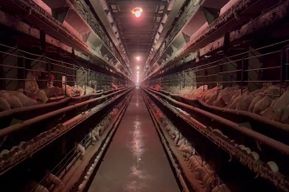
We have 30 days to take on Goliath – again
November 12, 2025
September 9, 2022
Our Polish branch Otwarte Klatki has conducted an investigation exposing the prevalence of a condition called white striping disease in chicken meat in Poland’s most popular supermarkets. The findings are disturbing: over 99% of examined chicken breast packages showed presence of the disease. White striping is a disorder that significantly reduces the quality of meat and is caused by the same factors that lead to the birds experiencing immense suffering.
The easily detectable white stripes on the chicken breast below are nothing but unwanted fat tissue. Where do they come from? Standard factory-farmed chicken breeds are known for their rapid growth – these birds are typically slaughtered at just 42 days old, and in this short time develop huge breast muscles that can be transformed into one of the most popular products in the meat industry: a chicken breast fillet. Genetic modifications have enabled this muscle to grow into an enormous, unproportionate size, bringing profits to the industry and tragic consequences for chickens. They routinely struggle with lameness (which means a life of chronic pain) and various disorders, such as white striping disease. The quality of meat affected by this particular disease is proven to be lower, but it’s not stopping the companies from selling this product to their customers. Nevertheless, the symptoms can be easily noticed by anyone in the supermarket aisle.

White striping disease – the report
Our study in Poland looked at own-brand chicken breast fillets at 5 large retailers: Aldi, Biedronka, Lidl, Kaufland and Netto. The findings of our investigation are very worrying and should be a clear sign that current factory farming practices not only cause animals unimaginable suffering, but also determine the low quality of food provided to the consumers who decide to buy chicken meat.
Primary conclusions:
Examples of moderate (1) and severe (2) white striping may be found below:


Effects and causes
White striping disease is reported by scientific research to be found in 50-90% of chicken breasts in general. Its presence reduces the nutritional value of the chicken meat, increasing fat content, lowering protein levels and decreasing the quality of protein by containing higher collagen content. White-striped meat is reported to be inferior to normal meat also in terms of texture and taste qualities.
The scientifically proven causes of white striping disease are mostly the genetics of fast growing chickens and the poor living conditions that they struggle to endure. Rapid growth can cause these birds to suffer severe walking problems, to live in chronic pain from debilitating lameness and sometimes even die from heart attacks as their internal organs fail to maintain the overwhelming weight. It also leads to various pathologies within the muscles, such as white striping disease. In terms of living conditions, the birds spend their lives crammed into a single shed by the tens of thousands, unable to walk freely or fulfil their most basic needs of perching or pecking. As a result, they spend most of their time stationary and apathetic, and in turn, this enhances their health problems.

What’s the solution?
Over 550 companies all over the world have already turned their back on these cruel practices by signing the European Chicken Commitment. It’s a policy of new science-backed standards that significantly improves the lives of chickens raised for meat. The most important requirement is to adopt breeds with slower, more balanced growth rates. As described above, this would decrease the severity of health issues currently occurring on a huge scale in intense factory farming and also improve the quality of products that stores and food producers claim to care about.
